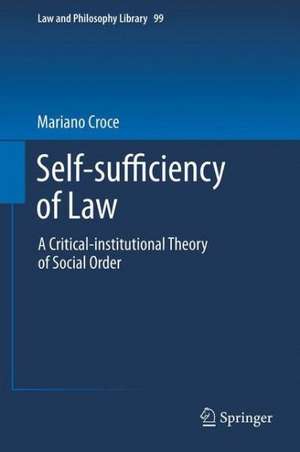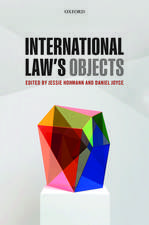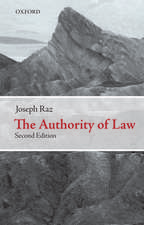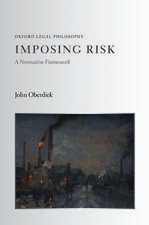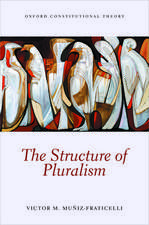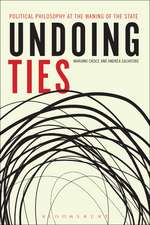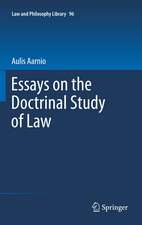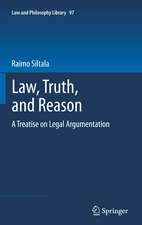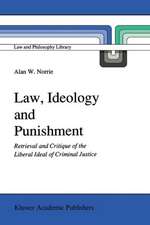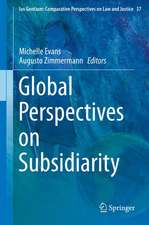Self-sufficiency of Law: A Critical-institutional Theory of Social Order: Law and Philosophy Library, cartea 99
Autor Mariano Croceen Limba Engleză Paperback – 18 iul 2014
| Toate formatele și edițiile | Preț | Express |
|---|---|---|
| Paperback (1) | 831.22 lei 38-45 zile | |
| SPRINGER NETHERLANDS – 18 iul 2014 | 831.22 lei 38-45 zile | |
| Hardback (1) | 841.35 lei 38-45 zile | |
| SPRINGER NETHERLANDS – 7 iun 2012 | 841.35 lei 38-45 zile |
Din seria Law and Philosophy Library
- 20%
 Preț: 813.10 lei
Preț: 813.10 lei - 20%
 Preț: 569.00 lei
Preț: 569.00 lei - 18%
 Preț: 1204.48 lei
Preț: 1204.48 lei - 18%
 Preț: 934.62 lei
Preț: 934.62 lei - 15%
 Preț: 573.62 lei
Preț: 573.62 lei - 15%
 Preț: 628.49 lei
Preț: 628.49 lei - 15%
 Preț: 630.74 lei
Preț: 630.74 lei - 18%
 Preț: 878.76 lei
Preț: 878.76 lei - 24%
 Preț: 797.37 lei
Preț: 797.37 lei - 15%
 Preț: 570.10 lei
Preț: 570.10 lei - 15%
 Preț: 634.11 lei
Preț: 634.11 lei - 18%
 Preț: 880.65 lei
Preț: 880.65 lei - 15%
 Preț: 634.11 lei
Preț: 634.11 lei - 20%
 Preț: 571.84 lei
Preț: 571.84 lei - 15%
 Preț: 631.23 lei
Preț: 631.23 lei - 18%
 Preț: 1211.46 lei
Preț: 1211.46 lei - 18%
 Preț: 1102.51 lei
Preț: 1102.51 lei - 15%
 Preț: 644.88 lei
Preț: 644.88 lei - 18%
 Preț: 771.26 lei
Preț: 771.26 lei - 18%
 Preț: 883.10 lei
Preț: 883.10 lei - 18%
 Preț: 999.47 lei
Preț: 999.47 lei -
 Preț: 383.72 lei
Preț: 383.72 lei - 24%
 Preț: 700.88 lei
Preț: 700.88 lei - 18%
 Preț: 982.72 lei
Preț: 982.72 lei - 18%
 Preț: 1096.94 lei
Preț: 1096.94 lei - 18%
 Preț: 1089.18 lei
Preț: 1089.18 lei - 15%
 Preț: 626.72 lei
Preț: 626.72 lei - 18%
 Preț: 768.75 lei
Preț: 768.75 lei - 24%
 Preț: 815.51 lei
Preț: 815.51 lei - 18%
 Preț: 772.93 lei
Preț: 772.93 lei - 18%
 Preț: 722.82 lei
Preț: 722.82 lei - 15%
 Preț: 642.33 lei
Preț: 642.33 lei - 18%
 Preț: 768.93 lei
Preț: 768.93 lei
Preț: 831.22 lei
Preț vechi: 1093.71 lei
-24% Nou
Puncte Express: 1247
Preț estimativ în valută:
159.13€ • 165.41$ • 131.94£
159.13€ • 165.41$ • 131.94£
Carte tipărită la comandă
Livrare economică 03-10 februarie 25
Preluare comenzi: 021 569.72.76
Specificații
ISBN-13: 9789400794818
ISBN-10: 9400794819
Pagini: 248
Ilustrații: XXX, 218 p.
Dimensiuni: 155 x 235 x 13 mm
Greutate: 0.35 kg
Ediția:2012
Editura: SPRINGER NETHERLANDS
Colecția Springer
Seria Law and Philosophy Library
Locul publicării:Dordrecht, Netherlands
ISBN-10: 9400794819
Pagini: 248
Ilustrații: XXX, 218 p.
Dimensiuni: 155 x 235 x 13 mm
Greutate: 0.35 kg
Ediția:2012
Editura: SPRINGER NETHERLANDS
Colecția Springer
Seria Law and Philosophy Library
Locul publicării:Dordrecht, Netherlands
Public țintă
ResearchCuprins
Introduction.- Part I. Law as a complex practice: the rule-based model .- Overview.- 1. Legal theory as a scientific discipline and the variety of rules.- 2. Legal validity and the problem of rule-acceptance .- 3. Reflective acceptance: reasons for action and criterion-rules.- 4. The legal practice and its (vanishing) borders .- Part II. Law as a selective practice: the social and the legal.- Overview.- 5. The pluralist divide.- 6. Legal pluralism revised: law as the product of selection.- 7. Classic institutionalism: jural reality and legal selection.- 8. Exploring the jural continuum .- Part III. The law as a special practice: legal field and social reality.- Overview .- 9. Negotiating reality: knowledge and categories in the legal field.- 10. The ritual dimension of law: normality, normativity, and critique.- Epilogue: defending a pluralist critical-institutional view of law.- Bibliography.- Index.
Textul de pe ultima copertă
Self-sufficiency of Law: A Critical-institutional Theory of Social Order investigates the role of law, legal categories, and legal experts in the organisational dynamics of social collectivities. It demonstrates that law is a stable practice among publicly recognised experts who are called upon to select the ?normative facts? of a population, that is, the set of standards that are proclaimed as binding on the entire collectivity. At the very same time it argues that the legal field also serves as a special trans-sectional and insulated venue in which lay people can renegotiate social reality by means of law?s special stock of knowledge and categories. To do this, the book proposes an integration of the recent research outcomes achieved in three different areas of study, namely, legal positivism, legal institutionalism, and legal pluralism. It examines, among others, the notions of rule, coercion, social practice and institution elaborated on by significant theorists in these fields, highlighting both the merits and flaws and ultimately advancing a notion of law that is able to account for the nature of the legal practice as a basic pillar of social order. This text also covers key guidelines for empirical research and political activities in Western and non-Western countries.
This marvellous book persuasively vindicates the critical role and practicality of pluralist legal theory. It shows in depth and with a solid chain of post-Hartian arguments that there is much more to debate than merely definitions of law. While not an easy read, this is refined legal theory of the highest quality.
Werner Menski
Professor of South Asian Laws, SOAS, University of London
This is a work of great erudition. Anyone with an interest in practice theory, socio-legal studies or legal pluralism must read this book.
Dennis Patterson
Professor of Legal Theory and Legal Philosophy, European UniversityInstitute
This book is an excellent contribution to both legal philosophy and the general theory of norms.
William Twining
Quain Professor of Jurisprudence Emeritus, University College London
This marvellous book persuasively vindicates the critical role and practicality of pluralist legal theory. It shows in depth and with a solid chain of post-Hartian arguments that there is much more to debate than merely definitions of law. While not an easy read, this is refined legal theory of the highest quality.
Werner Menski
Professor of South Asian Laws, SOAS, University of London
This is a work of great erudition. Anyone with an interest in practice theory, socio-legal studies or legal pluralism must read this book.
Dennis Patterson
Professor of Legal Theory and Legal Philosophy, European UniversityInstitute
This book is an excellent contribution to both legal philosophy and the general theory of norms.
William Twining
Quain Professor of Jurisprudence Emeritus, University College London
Caracteristici
A complete overview of the most recent research outcomes in three areas, legal positivism, legal pluralism and legal institutionalism Offers reasons for removing the barriers between philosophy, sociology and anthropology Suggests important guidelines for empirical research and politics in Western and non-Western countries
